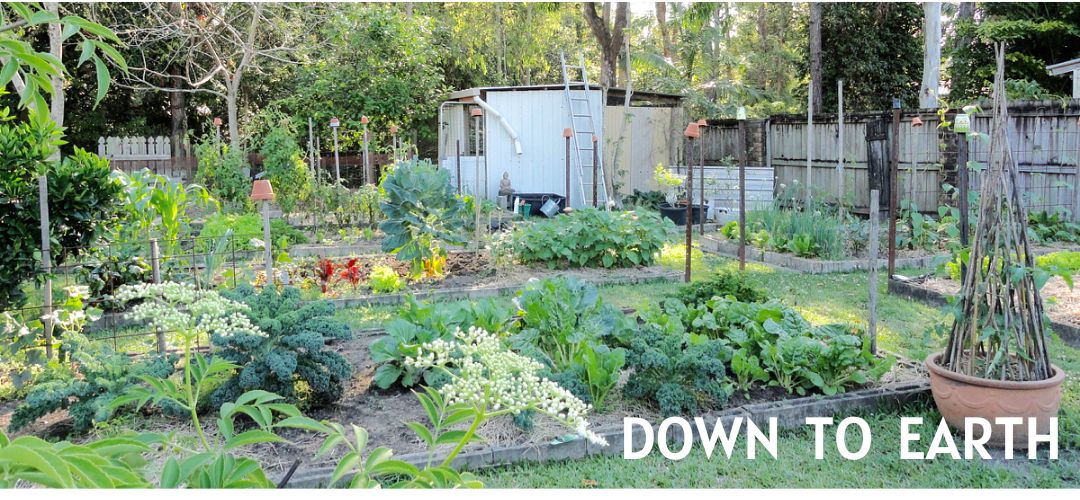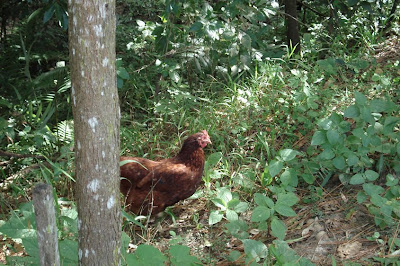I am sure most of you know that adding organic material, usually in the form of compost, to your soil will give you better crops. It's not just one addition, this is a continuing process that will become part of your gardening repertoire. When you first start a new garden, you add compost; when you're between crops and about to put in follow-up plants, you add compost; you can even plant into compost to give your crops a real boost - just scoop out a handful of soil, replace it with a handful of compost and plant your seed or seedling right into the compost.
There is no doubt about it, when you're gardening organically, you need a lot of compost. Of course you can buy compost, but just like everything else you buy, you really don't know what's in it, so here at our home, we always make our own, and we always have at least one form of compost on the go. At the moment we have several composts bubbling away in the backyard - we have our regular compost heaps, a compost bin, the worm farm and our chicken compost. I haven't written about chicken compost yet, so here goes.
Chickens are really happy when they can scratch around. It gives them something to do, it's part of their natural behaviour and when they find something to eat via their scratchings, they are rewarded for their work. We use this natural behaviour to work for us. Just at the side of the chicken coop, we have a small fenced area of about 6' x 5'. Generally the chook don't go into this area, they are usually outside the coop or free ranging in the backyard. We use this little yard to keep baby or new chickens separate from the flock until they're ready to be introduced, when it's not being used like that, we, or should I say, the chooks, make compost in there.
The floor of the chicken coop is cement but this area has a bare earth floor. When Hanno mows the lawn he dumps all the lawn clippings into this little space and as soon as the chooks see that happening, they rush in to scratch through it. Really that's basically it - but we do add other things to make a good compost. You can add anything that you'd put into your main compost bin - vegetable peelings, old fruit, garden waste and leaves, kitchen scraps, the contents of the vacuum cleaner, crushed egg shells, the contents of old flower pots, tea bags and leaves, coffee grounds, shredded paper, etc. It's a great way of using up your lawn clippings during summer when you can't put any more of them in your regular compost.
The chooks will mix in everything that we put in there. They eat some of the grass, which contains omega oils, they eat seeds, bugs and little bits of food, but the great value of them being there is that they turn the mix over a few times every day. As they work, they add their own droppings to the mix and that helps speed up decomposition. Depending on the time of year, we get great compost for the garden within four to six weeks.
If you want to try this, make sure you use an area with an earth floor that is contained by fences so the compost isn't spread out over a large area. The same rules apply for this as for general compost - no meat or dairy food, because they'll attract rats. If there has been no rain, sprinkle the hose over the mix so it's moist - not wet. If it's raining, cover it with a tarp so it doesn't become too wet. The rest is up to the chooks. They'll love it, it will give them something to do and they'll keep being rewarded with little treats they find. You'll be reward with fast compost. When all the grass and scraps disappear and turn into compost, just collect it with your wheelbarrow and use it on the garden.
I meant to answer this ages ago but forget. When it's really hot here, we make sure the chickens always have a shaded area they can sit in. When it's very hot for a long period of time, we fill upturned rubbish bin lids with cold water and leave them in the shade near where the chooks sit - they will use these to stand in when it's really hot. If you have your chickens confined in a hen house during hot weather, hose the roof of the house to cool things down for them. Sometimes there is nothing you can do and you will lose chickens to the harsh weather, but these little simple things can make a difference and are worth trying.
If you have other strategies for helping your girls cope with the hot weather, please share them with us. :- )





